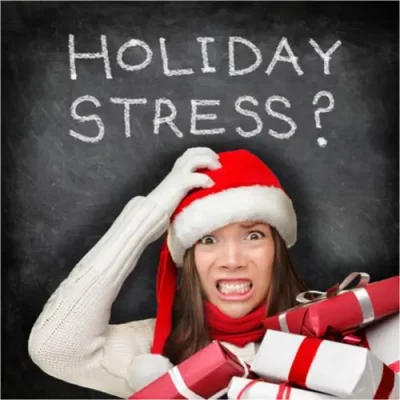It is holiday season and while things are outwardly joyful, you might still be wondering why the holidays are always so stressful? In this article, we will discuss:
- Holiday Expectations
- Causes for holiday stress
- What is Seasonal Depression?
- How common is seasonal depression?
- What causes SAD?
- Winter Blues vs Seasonal Depression
- Symptoms of seasonal depression
- Ways to relieve holiday stress
Why do people expect me to be happy around the holidays?
The holidays are a stressful time because there is an expressed and unexpressed expectation that everyone’s going to be happy. It’s the one time of year when we are supposed to drop all of what ails us to be kind and giving, right?
Unfortunately, this is just not realistic for everyone. Life is life and we aren’t always going to be happy.
I want to, first and foremost, tell you that you are not alone. Approximately 38% of adults in America do experience this. This is very common.
3 causes for holiday stress
- Unreasonable expectations
We know this is the time to be jolly, but what if you are not jolly by nature? Or what if something circumstantial is bringing you down?
It is easy to feel an additional level of stress or anxiety during this time due to unrealistic expectations.
If you feel like you have this unrealistic expectation for yourself, this feeling that I must be happy or I must be jolly, remind yourself that it’s OK to not be having the best day. It’s OK to be who you really are and not pretend to be someone else.
2. Unwanted Company
Sometimes seeing our families, having company parties, or spending time with certain people can bring back negative memories from the past.
It can be stressful in general, just being around people where you don’t quite feel yourself or where you feel shelled up.
What is seasonal depression?

Seasonal depression, also known as seasonal affective disorder (SAD), occurs each year at the same time, usually starting in the fall, worsening in the winter, and ending in the spring. This is more than just “winter blues” or “cabin fever”.
A more rare form of seasonal affective disorder is summer depression, which begins in late spring and ends in fall.
How common is seasonal depression?
Approximately half a million people in the United States suffer from winter SAD, while 10 to 20% may suffer from a milder form of winter blues or holiday stress.
An astounding 75% are woman with onsets of depression most often starting in early adulthood. Children and adolescents can also experience SAD but it is much less likely.
Not surprisingly, this illness is commonly seen in people who live in cloudy regions or at high latitudes (locations farther north or south to the equator).
What causes SAD?
The exact cause of seasonal depression is unknown, but evidence strongly suggests that for those vulnerable, SAD is set off by a decrease in sunlight.
Here a 3 suggested theories to support this:
- With less exposure to sunlight, the internal biological clock that regulates mood, sleep, and hormones is shifted. Thus, sunlight affects our biological clock.
- Brain chemicals (neurotransmitters, such as serotonin) that transmit information between nerves may be changed in people with SAD. Thus exposure to light may correct these imbalances.
- Melatonin, a chemical known to affect sleep patterns, may also play a role in seasonal affective disorder. It is suggested that a lack of sunlight stimulates the production of melatonin in some individuals. This may factor into the symptoms of sluggishness and sleepiness.
Winter Blues and holiday stress vs Seasonal depression
Many people suffering from seasonal depression share the same symptoms as regular depression, but it will only occur during certain times of the year. The difference between this and normal “winter blues” is how highly affected they are. If it is like clockwork and interfering with daily functioning it has become serious.
Symptoms of seasonal depression include:
- Sadness
- Anxiety
- Irritability
- Loss of interest in usual activities
- Withdrawal from social activities
- Inability to concentrate
- Extreme fatigue and lack of energy
- A “leaden” sensation in the limbs
- Increased need for sleep
- Craving for carbohydrates, and weight gain.
Symptoms of Summer Depression include:
- Weight loss
- Agitation and restlessness
- Trouble sleeping
- Decreased appetite
3 ways to relieve holiday stress
1.Be yourself.
Often people feel negative emotions when there are unrealistic or unmet expectations. Do not put an unrealistic expectation on yourself. Give yourself permission to be yourself.
2. Plan for holiday stressors.
It’s important for you to plan ahead for your stressors. If you know that you have a family event happening on Friday evening and you’re going to see someone that you don’t get along with, give yourself permission to not overload that day and plan in time for yourself.
Practice self care before and after.
And do your best to practice mindfulness when you are spending time with them. This will reduce the negative emotional impact.
In all honesty, not everyone is pleasant to be around. Remember the first tip and be realistic. Don’t expect them to change because it’s the holidays. People have to want to change themselves. So if you can’t force someone to change then you have to work on getting yourself to a place where you are able to have a bit more acceptance of what the situation is.
3. Think about what genuinely makes you happy.

Of course, spending time with your family, sharing gifts, and practicing religious/ cultural beliefs can be wonderful, but remember what truly makes you happy deep down inside. Focus on that.
A great way to improve happiness is by reminding yourself of what it is that you truly appreciate. This can be anything. It is yours to choose and feel.
You can simply think about it or even better, write it down. Keep a journal of all the different and positive things that happened that day. It really can be quite helpful.
How to combat seasonal depression
Here is a list of common practices to pull yourself out of a SAD state:
- More vitamin d – one could have a deficiency and not know it. Go outside, taking advantage of nice days and doing small bouts even when it’s cold. 8 minutes a day can be very significant.
- SAD lights – same effect as the sun
- Nutrition
- Counseling
- Self-care into your day – whatever that looks like for you.
Remember to love yourself!
Keep those three tips in mind while you are in the holiday season.
I know it can be a really challenging time but I have faith that you’ll be able to make it through.
If you need any additional assistance, Makin Wellness is always ready to help you heal and become happy again!
If you haven’t already, please comment on, share, and subscribe to Wellness Today for notifications on additional mental health, addiction, and relationship related topics.








